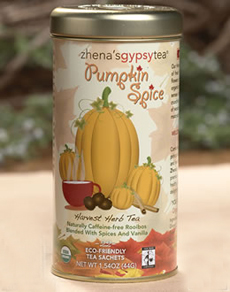PRODUCT & GIFT: Zhena’s Pumpkin Spice Tea
|
EDITOR’S NOTE 2020: Alas, this wonderful company disbanded operations in 2018. Instead of a chocolate turkey party favor, this year we’re sending our Thanksgiving guests home with a tin of pumpkin spice tea from Zhena’s Gypsy Tea. Zhena blends caffeine-free rooibos tea (pronounced roy-boss) into a warm, soothing cup that mimics the flavors of pumpkin pie with vanilla, orange peel, and a trio of pumpkin pie spices: cinnamon, clove and nutmeg. The line is organic, Fair Trade Certified and certified kosher by KSA*. Rooibos is a bush that grows in South Africa. The name means red bush in the Afrikaans† language; the leaves steep into a red-colored brew. Honeybush is a cousin to rooibos, also cultivated in South Africa. It is similar in flavor (slightly sweeter with a fuller body) but its flowers have the aroma of honey; hence the name. Rooibos is very healthy: no caffeine, high levels of antioxidants and low levels of tannin. Children—even infants—can drink it. We’ve been fans of Zhena’s since we first reviewed the teas in 2007 (here’s the review). |
 Caffeine-free tea to cap your Thanksgiving dinner or as favors. Photo courtesy Zhena’s Gypsy Tea. |
|
|
Zhena Muzyka is a proponent of giving back (a percentage of sales goes to very worthy causes), and was an early champion of sustainable, organic and Fair Trade agriculture. She sells more than 70 Fair Trade blends, which support the mission of providing better wages and working conditions for agricultural workers (more about Fair Trade). Airtight tins of 22 sachets are $6.67, with free shipping on orders over $35, at Amazon.com. For a sampler gift, Zhena’s Harvest Stackable has four tins, each with four sachets of Caramel Apple, Chocolate Truffle, Cranberry Bliss and Pumpkin Spice. They’re $8.99 at Zhenas.com. Learn the language of tea and be inspired to try different types of tea in our delicious Tea Glossary. †Afrikaans is a West Germanic language spoken in South Africa and Namibia and, to a lesser extent, in Botswana and Zimbabwe. It began to develop independently in the 18th century, an offshoot of several Dutch dialects spoken by the mainly Dutch settlers of what is now South Africa. |
||

